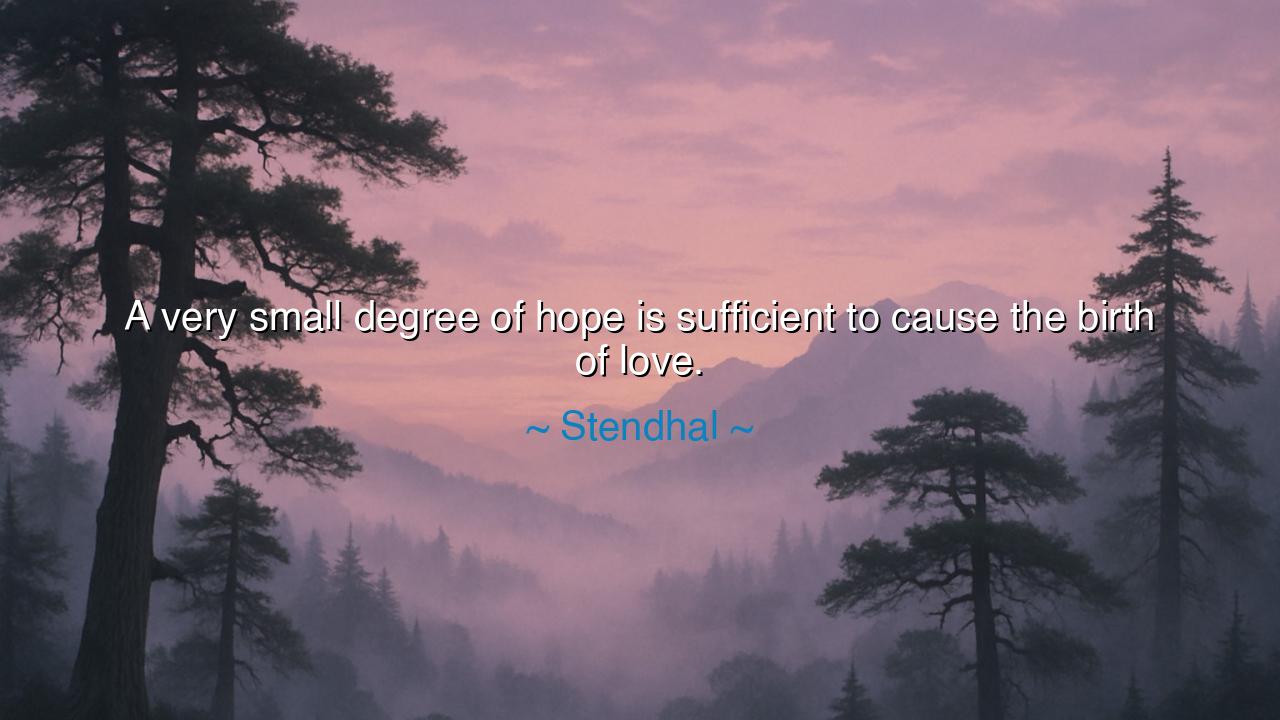
A very small degree of hope is sufficient to cause the birth of






"A very small degree of hope is sufficient to cause the birth of love." – Stendhal
In these delicate yet profound words, Stendhal, the French master of romantic observation, unveils the subtle alchemy of the human heart. He reminds us that love, that most powerful and transformative of emotions, need not be nourished by certainty or grand gestures; even the faintest glimmer of hope can spark its creation. Hope is the seed, fragile yet potent, and when it is planted in the fertile soil of longing, it gives rise to affection, devotion, and passion. Stendhal teaches that love, far from being a matter of reason alone, is born from possibility, anticipation, and the quiet courage of yearning.
The origin of this insight lies in Stendhal’s exploration of human emotions in works such as On Love, where he dissected the psychology of desire with both precision and poetry. Living in the early 19th century, a period steeped in social expectation and formal constraint, Stendhal observed that love often grows in shadow and subtlety, in glances and small gestures, in moments of tentative hope. Even the smallest sign — a smile, a kind word, a shared look — can ignite the heart and awaken feelings that transform a fleeting attraction into a profound, enduring connection. Thus, hope, even in its slightest measure, becomes the midwife of love.
This insight echoes the wisdom of the ancients, who understood love as both divine and human. Plato, in The Symposium, spoke of eros as a force that begins with desire and leads the soul toward beauty and truth. Yet even Plato acknowledged that the first spark is modest — a single gaze, a hint of connection, a hope that the other may reciprocate. Stendhal’s words mirror this ancient teaching: love is not birthed from certainty or dominance, but from the gentle flicker of possibility, the tender expectation that one’s heart might find another to meet it.
Consider the story of Shah Jahan and Mumtaz Mahal, whose love inspired the construction of the Taj Mahal. Their union began with hope — a delicate hope that evolved through time into profound devotion. Every letter, every shared glance, every whispered promise nurtured the flame of affection, proving that even modest hope can blossom into enduring love. Stendhal’s insight is captured here: love does not require certainty; it requires the courage to hope and the willingness to let that hope grow into devotion.
The subtlety of this wisdom lies in its universality. Love often begins in the quiet, hidden corners of the heart, unnoticed even by the one who feels it. Stendhal’s words remind us that we need not wait for grand omens or perfect conditions; even a small, tentative hope can set the machinery of the heart in motion. In relationships, in friendship, in acts of kindness, hope acts as the spark that transforms ordinary connection into profound attachment, the invisible hand that guides desire toward fulfillment.
Moreover, Stendhal teaches patience and attentiveness. The birth of love is not always immediate; it begins slowly, imperceptibly, nurtured by hope and circumstance. Like a gardener tending a tender seedling, one must recognize the first signs, water them with care, and protect them from despair. Even a small degree of hope can blossom if given attention, yet neglect or doubt can snuff it out. Love, therefore, is both a gift and a responsibility, requiring mindfulness and courage to allow hope to flourish.
Lesson: My children, carry this wisdom into your hearts: never underestimate the power of a small glimmer of hope. Do not wait for certainty to act upon your feelings, nor for perfect conditions to emerge. When you sense a connection, a shared spark, or even a whisper of possibility, nurture it with honesty, patience, and care. As Stendhal teaches, love often begins in the smallest hope — and from that humble seed, the most enduring and transformative emotions can grow.
In the end, Stendhal’s words are a call to bravery in the tender landscape of the heart. Hope, however slight, is a flame that can kindle a lifetime of devotion. To recognize it, to honor it, and to act upon it is to participate in the eternal cycle of human affection — a cycle in which the smallest hope can give birth to the most profound love, illuminating life with its gentle, unrelenting light.






AAdministratorAdministrator
Welcome, honored guests. Please leave a comment, we will respond soon